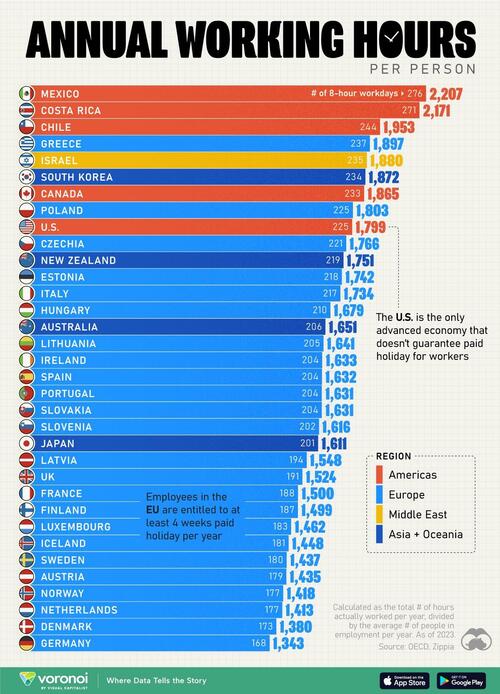Mexicans Work More Hours Than Anyone… Germans Not So Much
Do you feel like you work too much?
Curious about how long people work in other countries?
In this graphic, Visual Capitalist’s Marcus Lu ranked OECD countries based on average working hours per year, as of 2023.
It reveals a wide gap between the longest and shortest-working countries, to the tune of 864 hours (36 days).
Note that this data is based on the average number of people in employment in each country, meaning it includes full- and part-time workers.
Data and Key Takeaways
All figures were sourced from the OECD (Organisation for Economic Co-operation and Development), an international organization that promotes policies to improve economic and social well-being. It has 38 member countries, though in this instance, data for all of them was not available.
For additional context, hourly figures were also converted to the number of eight-hour workdays.
Country
Annual Hours
Worked per Person
# of 8-hour
Workdays
🇲🇽 Mexico
2207
276
🇨🇷 Costa Rica
2171
271
🇨🇱 Chile
1953
244
🇬🇷 Greece
1897
237
🇮🇱 Israel
1880
235
🇰🇷 Korea
1872
234
🇨🇦 Canada
1865
233
🇵🇱 Poland
1803
225
🇺🇸 U.S.
1799
225
🇨🇿 Czechia
1766
221
🇳🇿 New Zealand
1751
219
🇪🇪 Estonia
1742
218
🇮🇹 Italy
1734
217
🇭🇺 Hungary
1679
210
🇦🇺 Australia
1651
206
🇱🇹 Lithuania
1641
205
🇮🇪 Ireland
1633
204
🇪🇸 Spain
1632
204
🇵🇹 Portugal
1631
204
🇸🇰 Slovakia
1631
204
🇸🇮 Slovenia
1616
202
🇯🇵 Japan
1611
201
🇱🇻 Latvia
1548
194
🇬🇧 UK
1524
191
🇫🇷 France
1500
188
🇫🇮 Finland
1499
187
🇱🇺 Luxembourg
1462
183
🇮🇸 Iceland
1448
181
🇸🇪 Sweden
1437
180
🇦🇹 Austria
1435
179
🇳🇴 Norway
1418
177
🇳🇱 Netherlands
1413
177
🇩🇰 Denmark
1380
173
🇩🇪 Germany
1343
168
At the top of this ranking are three countries from the Americas: Mexico, Costa Rica, and Chile.
This could be due to several reasons, including:
Economic structure: Labor-intensive industries like agriculture play a large role in their economies
Social policies: These countries may have less extensive social safety nets, meaning workers work more to compensate for the lack of government support
Lower wages: Lower average wages in these countries can lead people to work longer hours to improve their living standards
At the lower end of this ranking are a large number of European countries, particularly those with advanced economies. It should be noted that in the European Union (EU), all employees are entitled to at least four weeks paid holiday per year.
This is a stark contrast from the U.S., which is the only advanced economy in the world that does not guarantee paid holiday for workers.
One major outlier in this dataset is Greece, which ranked fourth at 1,897 average annual hours. The country has been struggling to boost economic growth, and more than 500,000 people have left the country since its debt crisis in 2009.
It was recently announced that Greece would be allowing certain employers to introduce a six-day work week.
If you enjoyed this post, be sure to check out Ranked: The Cities with the Best Work-Life Balance in the World.
Tyler Durden
Thu, 07/25/2024 – 05:45

